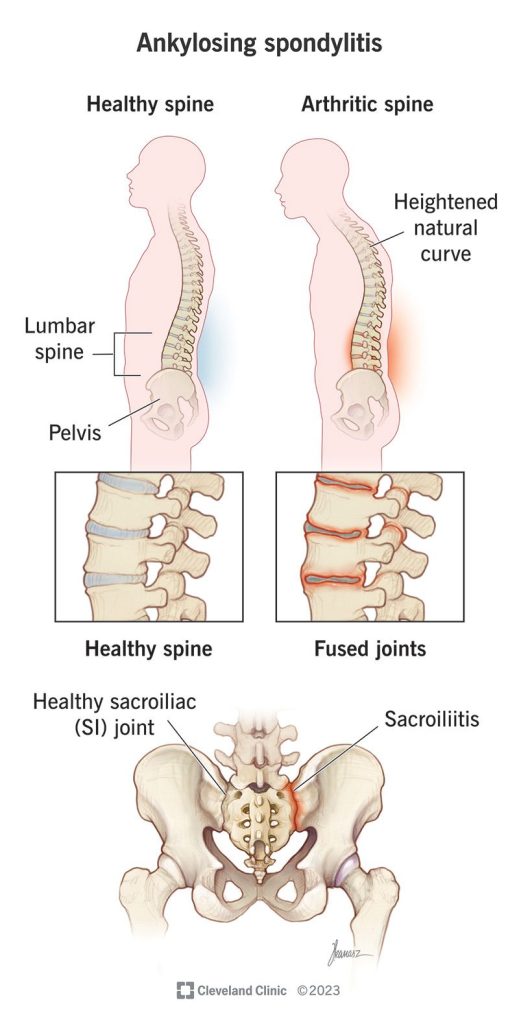
Ankylosing Spondylitis (AS) is a chronic inflammatory disease primarily affecting the spine and sacroiliac joints, potentially leading to fusion of vertebrae. In Ayurveda, while there’s no direct one-to-one correlation for AS, its clinical presentation, particularly the pain, stiffness, and inflammatory nature, strongly aligns with aspects of Amavata (rheumatoid arthritis-like conditions, where ‘Ama’ or toxins, combine with vitiated Vata dosha) and Asthi-Majjagata Vata (Vata affecting bone and bone marrow tissue). There can also be involvement of Pitta dosha due to the inflammatory component.
The Ayurvedic treatment for Ankylosing Spondylitis focuses on a holistic approach to manage symptoms, slow down disease progression, improve mobility, and enhance the overall quality of life. The core principles include:
- Ama Pachana (Digestion of Toxins): Addressing the root cause by improving digestion and metabolizing ‘Ama’ (undigested toxic material) that accumulates in the joints and channels.
- Vata Shamana (Vata Pacification): Balancing the aggravated Vata dosha, which is responsible for pain, stiffness, and degeneration.
- Agnideepana (Enhancing Digestive Fire): Strengthening the digestive fire (Agni) to prevent further Ama formation.
- Shodhana (Detoxification): Through Panchakarma therapies to eliminate deep-seated toxins.
- Rasayana (Rejuvenation): Nourishing and strengthening the bones, joints, and other affected tissues.
- Reducing Inflammation: Through specific herbs and therapies.
Here’s a detailed breakdown of Ayurvedic treatment for Ankylosing Spondylitis:
I. Panchakarma Therapies (Detoxification and Purification): Panchakarma is highly recommended for AS to cleanse the body, reduce inflammation, and restore balance. The choice of therapies depends on the individual’s dosha imbalance and the stage of the disease.
- Abhyanga (Herbal Oil Massage): Regular full-body or localized massage with warm medicated oils like Mahanarayana Thailam, Ksheerabala Thailam, Sahacharadi Thailam, Nirgundi Taila, Kottamchukkadi Thailam, or Dhanwantharam Thailam. It helps to reduce pain, stiffness, improve circulation, relax muscles, and pacify Vata.
- Swedana (Fomentation/Steam Therapy): Done after Abhyanga, this helps in relaxing muscles, reducing stiffness, and aiding toxin elimination.
- Kizhi (Pinda Sweda): Herbal poultices (bundles) containing medicated leaves (Elakizhi), herbal powders (Podi Kizhi), or special Navara rice cooked in milk (Navarakizhi) are heated and applied to the affected areas. This provides deep heat, reduces inflammation, pain, and stiffness, and improves blood flow. Choorna Pinda Sweda is particularly beneficial for Ama-Vata conditions.
- Pizhichil (Oil Bath Therapy/Kaya Seka): A continuous stream of warm medicated oil is poured over the body with gentle massage. This is highly nourishing, deeply pacifies Vata, and helps reduce stiffness and pain, especially in the spine.
- Patra Potali Sweda: Similar to Elakizhi, where fresh leaves of Vata-pacifying herbs are used in boluses for localized application.
- Greeva Basti / Kati Basti / Prishta Basti (Localized Oil Retention): Medicated oil is retained over the neck (Greeva Basti), lower back (Kati Basti), or entire spinal region (Prishta Basti) using a dough dam. This deeply nourishes the spinal discs, ligaments, and nerve roots, providing significant relief from pain, stiffness, and improving flexibility.
- Basti (Medicated Enema): Considered the most effective treatment for Vata disorders and for expelling Ama from the colon (the primary site of Vata). Different types of Basti are used:
- Sneha Basti (Oil Enema): Administered with medicated oils (e.g., Mahanarayana Thailam, Ksheerabala Thailam, Nirgundi Taila). It nourishes the body, pacifies Vata, and helps improve joint flexibility.
- Kashaya Basti (Decoction Enema): Administered with herbal decoctions (e.g., Dashamoola Kashaya, Rasnairandadi Kashaya). It helps cleanse the colon, reduce Ama, and pacify Vata and Kapha. Often, a combination of Sneha and Kashaya Basti (Yoga Basti or Karma Basti) is given in a specific sequence.
- Virechana (Therapeutic Purgation): If there’s significant Pitta (inflammation) or Kapha (heaviness, sluggishness) involvement and accumulated Ama, medicated purgation helps eliminate these toxins, thereby reducing inflammation and improving metabolism.
- Nasya (Nasal Administration): Administering medicated oils (e.g., Ksheerabala Thailam, Anu Thailam) or herbal juices through the nostrils. This is especially useful for symptoms affecting the neck and upper spine, helping to relieve stiffness, headaches, and improve nerve function.
II. Shamana (Palliative Therapies & Herbal Medicines): Internal medications are prescribed to manage symptoms, reduce inflammation, and strengthen the body.
- Guggulu Preparations: Highly effective for joint disorders.
- Yogaraja Guggulu, Mahayogaraja Guggulu, Trayodashanga Guggulu, Simhanada Guggulu, Punarnavadi Guggulu: These formulations have potent anti-inflammatory, analgesic, and Ama-digesting properties. They help reduce stiffness, pain, and support joint detoxification.
- Anti-inflammatory and Analgesic Herbs:
- Ashwagandha (Withania somnifera): A powerful adaptogen and anti-inflammatory. It helps reduce stress, pain, and strengthens muscles and nerves.
- Shallaki (Boswellia serrata): A well-known anti-inflammatory herb, often compared to NSAIDs, helps reduce joint inflammation and pain.
- Guduchi (Tinospora cordifolia): An immunomodulator, anti-inflammatory, and Ama-digesting herb, helpful in autoimmune conditions.
- Rasna (Pluchea lanceolata): Excellent for Vata-pacification, reducing stiffness and pain.
- Nirgundi (Vitex negundo): Possesses analgesic and anti-inflammatory properties, useful for muscle spasms and nerve pain.
- Shunthi (Ginger): A potent anti-inflammatory and Ama-digesting agent.
- Haridra (Turmeric/Curcuma longa): Contains curcumin, a strong anti-inflammatory and antioxidant.
- Triphala: A combination of three fruits (Amalaki, Bibhitaki, Haritaki). It’s a mild laxative, detoxifying agent, and helps in Ama elimination.
- Punarnava (Boerhavia diffusa): Helps reduce swelling and fluid retention.
- Classical Formulations:
- Dashamoolarishta: A tonic that reduces inflammation, pain, and strengthens the musculoskeletal system.
- Rasnasaptakam Kashayam/Kwath: A decoction effective in Vata-Kapha-related joint pain and stiffness.
- Amruthotharam Kashayam: Helps in Ama digestion and reduces inflammation.
- Maharasnadi Kwath: Beneficial for joint pain and stiffness, improving mobility.
- Agnitundi Vati: Improves digestive fire and helps in Ama digestion.
- Chandraprabha Vati: A general tonic for the genitourinary system, it also supports bone and joint health.